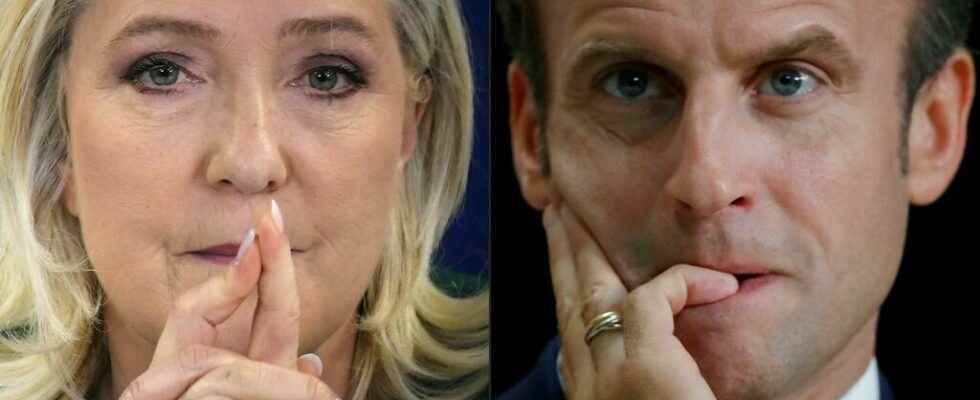On April 24, 2022, the French will have to choose in the second round of the presidential election between Emmanuel Macron, outgoing president, and Marine Le Pen, candidate of the National Rally. As in 2017, the two finalists claim to defend household purchasing power, but their economic programs are very different.
Pensions crystallized part of the debates on economic programs in this first week between the two rounds. The candidates differ on the retirement age.
Marine Le Pen has certainly forgotten a return to retirement at age 60 for all, as she advocated in 2017, but she has not completely thrown the reform in the trash. The retirement age would be lowered to 60 for people who started working before the age of 20. Those who entered working life between the ages of 20 and 24 and a half would leave between the ages of 60 and 62. For the others, no change, apart from indexing pensions to inflation, which in theory already exists, but is not always applied.
As for the minimum old age, it would be increased to 1,000 euros. This minimum pension, Emmanuel Macron plans to set it at 1,100 euros at the full rate.
►Read also: What do Marine Le Pen and Emmanuel Macron offer on immigration ?
In addition, the outgoing president no longer proposes, as in 2017, a complete overhaul of the pension system, a reform which had aroused strong opposition before being postponed due to the pandemic and the economic crisis.
However, Emmanuel Macron does not plan to stay at the status quo. He proposes to gradually raise the retirement age to 65, from 62 today, and to abolish the main special schemes. However, in an attempt to smooth things over, he said he was ready to provide for a review clause when the retirement age reached 64.
None of these pension reform projects, always a sensitive subject for the social partners, gets a good point from the CGT. The general secretary of the union regrets that Emmanuel Macron “ didn’t let go at all “. On the other hand, Philippe Martinez accuses Marine Le Pen of wanting break social security » by eliminating social security contributions.
Taxation
On the tax side specifically, the two candidates promise tax cuts for households. Marine Le Pen proposes lowering VAT on energy products to 5.5% and suggests exempting those under 30 from income tax. The National Rally candidate also intends to abolish the fee by privatizing public broadcasting.
This fee, Emmanuel Macron also wants to remove it, not to mention privatization.
These tax cuts for households obviously have a cost for the public accounts. It differs significantly from one program to another: 19 billion euros over a five-year term for Marine Le Pen, against 7 billion euros for Emmanuel Macron.
Both also provide for corporate tax cuts.
Marine Le Pen is particularly targeting VSEs-SMEs which, according to her, will be the main ” affected by the reduction in production taxes “. But if she denounces the trade deficit of France and advocates sovereignty in her program, the candidate “ does not really have a solution on the question of relocation, on the trade deficit », estimates, with AFP, Mathieu Plane, economist at the OFCE. Its flagship proposal in this area is the creation of a “French sovereign fund” in which the French could invest against a remuneration of 2% minimum.
The outgoing president also intends to continue reducing production taxes by abolishing the contribution on the added value of companies.
The charges would also drop for the self-employed. That said, even if the candidate president still wants to support the competitiveness of companies, Mathieu Plane notes “ a turn with the defense of a stronger, more interventionist state », where in 2017 « there was in his speech on the start-up nation, the importance of globalization “.
Bonuses or salary?
On the subject of labor compensation, Emmanuel Macron wants to force companies that pay dividends to share part of the profits with their employees through participation measures, profit-sharing or tax-free bonuses, bonuses for which he intends to triple the ceiling. Still with a view to increasing the purchasing power of employees, Marine Le Pen wants to encourage companies to raise wages by exempting from contributions those who increase by 10% employees who receive less than three Smic.
Finally, with regard to social benefits, Emmanuel Macron takes a step to the left by defending the payment of benefits “at source” to all those who are entitled to them in order to increase the number of beneficiaries. But he takes a big step to the right with conditioning the RSA to 15 hours or 20 hours of insertion activity.
On the question of social assistance, its rival intends to tackle fraud and reserve social assistance for the French.
Deficit in perspective
In the end, the programs of one or the other lead to unbalanced budgets according to the evaluations of the Montaigne Institute, but not at the same level. Emmanuel Macron’s measures would increase the public deficit by 44.5 billion euros. Those of the candidate of the National Rally would be even more expensive and would widen the deficit of 101.8 billion euros, according to the same source.
Beyond the figures, among the savings proposed by Marine Le Pen, “ there are several that are complicated to achieve, as they are based on measures that are either unconstitutional or contrary to European or international law “, insists Victor Poirier, director of publications of the Montaigne Institute with AFP. He cites, for example, the drop in the French contribution to the European Union budget or the revision of free trade agreements.
In the entourage of the candidate, work emanating from bodies is evacuated which, according to those close to her, ” almost always political proximity to other candidates “.
With agencies
